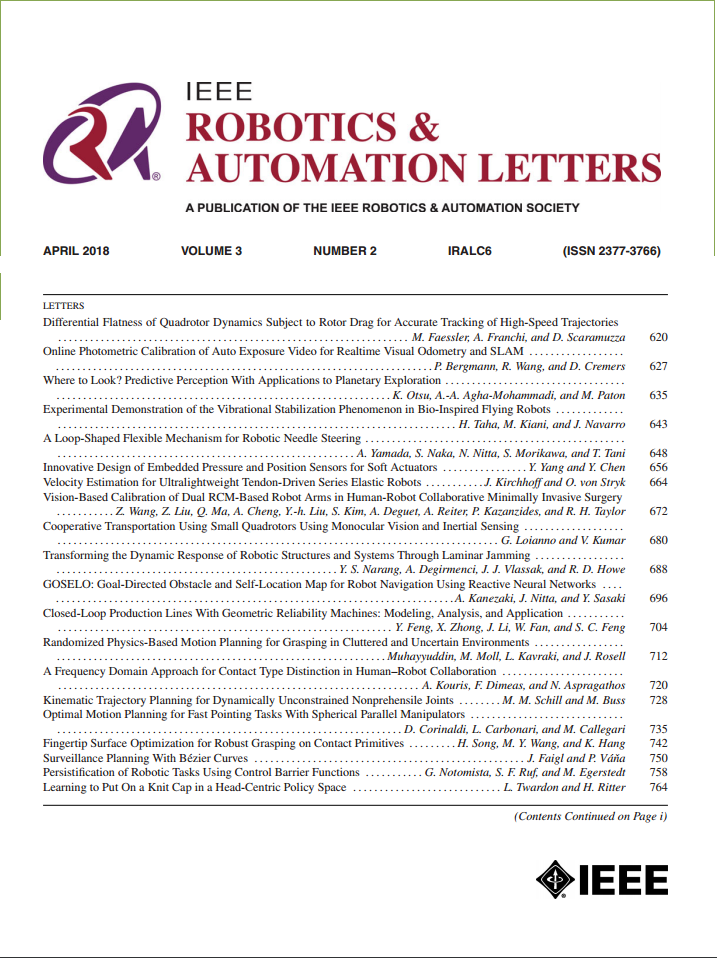针对气动软机器人的物理引导式深度学习代理建模
IF 4.6
2区 计算机科学
Q2 ROBOTICS
引用次数: 0
摘要
近年来,由柔软和顺应性材料构成的软体机器人在安全和适应性操作以及与动态环境的互动方面得到了长足发展。对软体机器人复杂的非线性行为建模和对其可变形结构的控制是一项挑战。本研究旨在建立一个物理引导的深度学习(PGDL)计算框架,将物理模型集成到深度学习框架中,作为软机器人的代理模型。一旦训练完成,这些模型就能取代计算成本高昂的数值模拟,从而缩短计算时间,实现实时控制。该 PGDL 框架是首个将软机器人的第一原理物理融入深度学习的框架之一,旨在为软机器人建模和控制建立高精度且计算成本低廉的模型。我们使用三种不同行为和几何形状的气动软手指以及两种训练和测试方法实施并验证了所提出的框架,以证明其有效性和可推广性。结果表明,在各种加载条件下,预测的变形曲率以及最大和最小变形的均方误差(MSE)低至 10^{-4}$ mm$^{2}$。所提出的 PGDL 框架是从第一原理物理学构建的,通过仔细考虑控制方程、辅助方程以及相应的边界和初始条件,本质上可适用于各种条件。本文章由计算机程序翻译,如有差异,请以英文原文为准。
Physics-Guided Deep Learning Enabled Surrogate Modeling for Pneumatic Soft Robots
Soft robots, formulated by soft and compliant materials, have grown significantly in recent years toward safe and adaptable operations and interactions with dynamic environments. Modeling the complex, nonlinear behaviors and controlling the deformable structures of soft robots present challenges. This study aims to establish a physics-guided deep learning (PGDL) computational framework that integrates physical models into deep learning framework as surrogate models for soft robots. Once trained, these models can replace computationally expensive numerical simulations to shorten the computation time and enable real-time control. This PGDL framework is among the first to integrate first principle physics of soft robots into deep learning toward highly accurate yet computationally affordable models for soft robot modeling and control. The proposed framework has been implemented and validated using three different pneumatic soft fingers with different behaviors and geometries, along with two training and testing approaches, to demonstrate its effectiveness and generalizability. The results showed that the mean square error (MSE) of predicted deformed curvature and the maximum and minimum deformation at various loading conditions were as low as
$10^{-4}$ $^{2}$
求助全文
通过发布文献求助,成功后即可免费获取论文全文。
去求助
来源期刊

IEEE Robotics and Automation Letters
Computer Science-Computer Science Applications
CiteScore
9.60
自引率
15.40%
发文量
1428
期刊介绍:
The scope of this journal is to publish peer-reviewed articles that provide a timely and concise account of innovative research ideas and application results, reporting significant theoretical findings and application case studies in areas of robotics and automation.
 求助内容:
求助内容: 应助结果提醒方式:
应助结果提醒方式:


